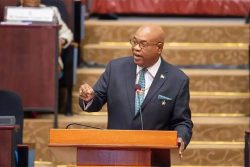Dear Editor,
I support Mr Ian McDonald and others like him pleading for old Guyana records to be preserved. Whether the records are newspapers, letters, diaries, memoirs, census data or photographs, they are the histories of individuals, families, organizations or the nation as a whole. Unfortunately, in Guyana’s case, though, records are ill-treated or destroyed by insensitive individuals, organizations and government officials. However, the biggest killer of records in Guyana could be the lack of money to create sufficient storage space in homes, offices, or official libraries and archives. Added to the shortage of space is the matter of paying for the best forms of storage. But should money be a problem?
While working as a folklore collector, I found very unhappy people who said that they would pay heaps of money for just one photograph to show me of a great-grandmother or grandfather dancing queh-queh or, better yet, an audio recording of it. I met people, too, who used to know a certain queh-queh song but had forgotten it. And this lack of a record occurs in many other areas of folklore. There are two points to highlight here.
The first is that oral records are also records. They allow the ‘oralists’ their chance to add to their nation’s history. Nevertheless, there is no guarantee that oral records will survive – memories will fade and people will die, taking the information with them. As far as possible, the ‘old time’ word-of-mouth stories should be documented and preserved.
The disadvantages of oral records emphasize why most people think that written and other forms or record-keeping are more desirable. Mind you, the crux of the matter should be preservation that will last thousands of years or forever. Though it will be very, very expensive, Guyana now has opportunities to use the highest quality paper, film, video, etc.
Perhaps, individuals and organizations conscious of the value of records, and the Guyana government, too, should use all available means to awaken the nation to the significance of records as national pillars of reconstruction.
Then, we must train our national record-keepers and somehow find the money for careful record storage. That way, hopefully, Guyanese of the future may not have to spend thousands trying to refurbish badly kept records or unhappily say that they would give millions for some lost record.
Yours faithfully,
Roy Brummell








